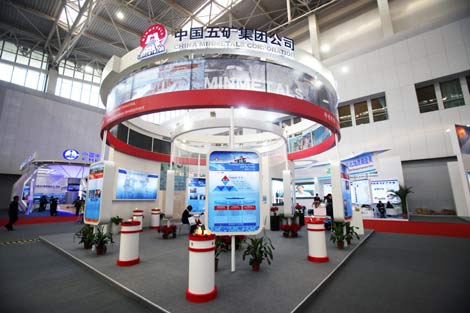SASAC to tighten approval process for SOE investments
Updated: 2012-07-12 10:38
By Wei Tian (China Daily)
|
|||||||||||
|
 |
|
A China Minmetals Corp booth at a mining conference in Tianjin. Statistics from the Ministry of Finance showed that the profits of SOEs are declining amid shrinking market demand and fluctuations in energy and commodities prices. [Photo / China Daily] |
China's national assets watchdog may tighten the approval process of large investment projects by State-owned enterprises, in a bid to maintain growth as the economy faces more downward pressure.
Meng Jianmin, a vice-chairman of the State-owned Assets Supervision and Administration Commission, said at a meeting last week that SOEs should strengthen the viability process on major investment projects, as well as introduce stricter controls on the management of the nation's assets.
Meng's words came after another senior official said last month that SOEs must prepare for "winter conditions" in the next three to five years.
"After 30 years of rapid development, the Chinese economy has come to a period of contraction," Shao Ning, a vice-chairman of the SASAC, said at a meeting in Chongqing.
"During a contraction, cost factors play a more obvious role in a company's development, so SOEs must pay more attention to cost control," Shao said.
To that end, SOEs will have to put a brake on the extravagant expansion pursued in previous years, he said.
Data from local authorities showed that investments by central SOEs increased 42-fold in the last four years to more than 11 trillion yuan ($1.7 trillion) in 2011.
"If the 4-trillion-yuan investment package in 2008 was to battle the global financial crisis, an even faster pace of investment of SOEs in 2011 should cause worries," added Tang Min, counselor of the State Council.
Tang said the efficiency of these investments also showed little cause for cheer.
With their 27 trillion yuan in total assets, the central SOEs only generated less than 1 trillion yuan in net profits in 2011, which translated to an after-tax return on assets of 3.2 percent, even less than the annual deposit rate of 3.25 percent.
Although the data for the first half of this year is yet to be released, statistics from the Ministry of Finance showed that SOEs' profits are declining amid shrinking market demand and fluctuations in energy and commodities prices.
In the first five months, central SOEs posted a total profit of 581 billion yuan, down 7.8 percent compared with a year ago. The May figure was 16.3 percent lower than that of April.
An official with the investment department of China Minmetals Corp, who declined to be named, said the company should be "more cautious" in investment because of the uncertainties in the Chinese economy.
A manager with Wuhan Iron and Steel Corp said that while completing construction projects, it will "live within its means" within the next three to five years, and reduce its overseas investment projects to ensure its financial safety.
Both of them, quoted by 21st Century Business Herald, said that if SASAC adopted stricter rules in approving investment projects by central SOEs, this could lead to delays in some projects.
Premier Wen Jiabao on Tuesday stressed the role of a "reasonable increase in investment" in maintaining stable growth. Economists forecast GDP growth in the second quarter may drop to as low as 7.5 percent.
Rail, public utilities, energy, telecoms, medical services and education will be open to capital investment to boost investor confidence, the premier said.
"But we don't need another 4-trillion-yuan stimulus as the current economic situation is better than 2008," said Hu Chi, a researcher with SASAC's research center.
Hu said unlike the massive investment in infrastructure in 2008, investment this time should focus more on strategic emerging industries.
Xu Baoli, another researcher with SASAC's research center, said the massive expansion of central SOEs since the commission was established in 2003 has concealed poor quality assets.
"The issue may not be obvious in a booming economy, but will become more obvious if the situation worsens," Xu said.
"In the future, SOEs should change their development goal from pursuing quantity to quality and from expansion in scale to improvements in competitiveness," he said.
weitian@chinadaily.com.cn
Related Stories
SOEs' profits continue falling 2012-06-16 12:55
SOEs urged to prepare for tougher times 2012-06-25 19:59
Central SOEs donate 3.77b yuan in 2011 2012-06-15 16:07
SOE to promote technology transfer 2012-06-05 08:06
China's SOEs to absorb more private capital 2012-05-25 17:08
Today's Top News
President Xi confident in recovery from quake
H7N9 update: 104 cases, 21 deaths
Telecom workers restore links
Coal mine blast kills 18 in Jilin
Intl scholarship puts China on the map
More bird flu patients discharged
Gold loses sheen, but still a safe bet
US 'turns blind eye to human rights'
Hot Topics
Lunar probe , China growth forecasts, Emission rules get tougher, China seen through 'colored lens', International board,
Editor's Picks

|

|

|

|

|

|





